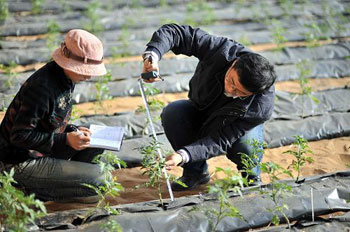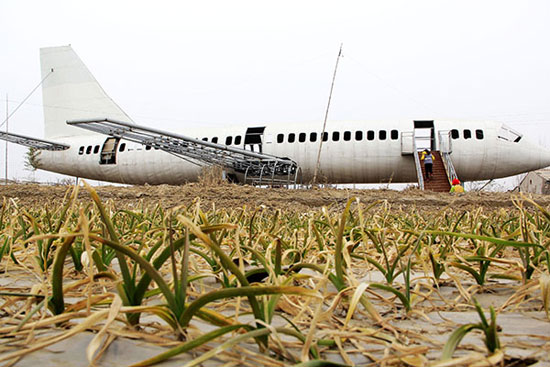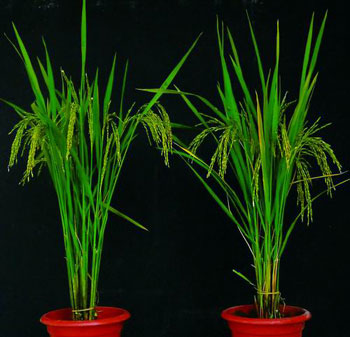Internet + is a water conservancy fool to farm the land.
Original title: what will Internet + agriculture change?
-- Exploration of Water and Fertilizer Integration by Beijing Academy of Agricultural and Forestry Sciences

Dr Guo Wenzhong (right) and his colleagues observe the growth of vegetables in a desert greenhouse. (data map)
172items, 26 billion cubic meters, more than 78 million mu.
These are the three figures put forward by the State Council at its executive meeting last year. Specifically, in 2014, 2015 and during the 13th five-year Plan period, 172 major water conservancy projects were built step by step, realizing 26 billion cubic meters of agricultural water-saving capacity and increasing the irrigated area by more than 78 million mu.
As we all know, China's agriculture is facing serious challenges because of its large population, little land and lack of water. How to solve the difficult problem has become an urgent task to ensure agricultural security.
At the Beijing Academy of Agricultural and Forestry Sciences, researcher Guo Wenzhong, director of the facilities Engineering Department of the National Agricultural Intelligent equipment Engineering and Technology Research Center, believes that the integration of water and fertilizer is one of the important ways for modern agriculture to break through. Over the years, he and a group of experts have been working hard to improve the intelligent level of water and fertilizer integration in our country.
"three accounts" strengthen the road of scientific research: not to be a simple "time controller"
In order to explain the current situation of the integration of water and fertilizer in China, Guo Wenzhong calculated "three accounts" for the reporter.
The first account: the "saving account" of the integration of water and fertilizer.
"the integration of water and fertilizer is recognized as a highly efficient water-saving and fertilizer-saving technology in the world, mainly according to soil characteristics and crop growth rules, using irrigation equipment to supply water and nutrients evenly, accurately, regularly and quantitatively to crops at the same time." "compared with traditional water and fertilizer management methods, this technology can increase production by 15 percent, 25 percent, 30 percent, 40 percent, and 50 percent, respectively, on protected vegetables," he said.
The second account: China's "water and fertilizer account".
The annual water consumption in agriculture is about 360 billion cubic meters, with a gap of more than 30 billion cubic meters. The production efficiency of irrigation water is 1 kg / cubic meter, which is only 1 kilogram per cubic meter compared with that of the United States, Israel and other countries. The annual consumption of chemical fertilizer in China exceeds 54 million tons (net), ranking first in the world, and the average utilization rate is only 30%, which is more than 20% lower than that of developed countries. "
The third account: the proportional account for the integrated application of water and fertilizer in various countries.
The proportion of integrated application of water and fertilizer in Israel is more than 90%. In the United States, 25% of corn, 60% of potatoes and 32% of fruit trees use the integration of water and fertilizer. At present, the area of water and fertilizer integration (drip irrigation and micro-sprinkler irrigation) accounts for only 0.13% of the irrigated area in China.
"We still have a big gap. In practical applications, we generally introduce foreign equipment. However, due to the different soil environment and agricultural needs, these equipment may not necessarily be in line with the actual local production. " He said, "A lot of foreign equipment has been applied in China, in fact, there is only a simple 'time controller' as a control strategy. For example, if it rains, the farmland does not need so much water, and if there is no human intervention to shut down the system, the system will still carry out regular and quantitative replenishment of water and fertilizer. "
"Don't make a simple time controller." "adhering to the intelligent and localized integrated water and fertilizer control strategy and equipment research and development is the direction of our efforts," he said. "
Provide system management solutions: make machines really smart
"We hope to buy smart machines from abroad, but when we use imported equipment worth hundreds of thousands of yuan, we find that it is not smart." Guo Wenzhong said.
He analyzed: "the reason for this is not that foreign researchers are not smart. Agricultural scientific research is time-consuming and laborious, and there are great differences in different regions. Foreign countries engaged in the integration of water and fertilizer, mostly companies, it is impossible to make so much effort to come to China, research in various places. Therefore, many of the functions of the equipment they sell to us have not been brought into full play, and there is a lack of system management programs aimed at the actual production needs of our country. "
If the soil environment is different, the proportion of water and fertilizer is different; different crops are planted, which also determines that the function of water and fertilizer integration equipment cannot be single; the sunshine time and evaporation degree are different, so water and fertilizer naturally cannot adopt the same strategy; different regions, several crops a year are also different, the formulation of the plan is not the same.
"many people think that the integration of water and fertilizer is very earthy and does not contain much science and technology. In fact, this is a misunderstanding. There are too many complex factors that make it very difficult to implement the integration of water and fertilizer. " "everyone says it should be intelligent, but there are a lot of problems in this area," he said. The operation of the equipment is too complex for farmers to use; the operation is simple and the function is simple. "
Be smart and simple. In order to achieve this goal, experts from the Beijing Academy of Agricultural and Forestry Sciences keep collecting data in the fields. At the same time, they joined forces with local meteorological and agricultural departments to obtain a large amount of timely and accurate information.
"with this data, we will be able to build a relatively perfect system. At this time, we as a platform, the implementation of remote control, but also continue to upgrade. As long as the farmers turn on the equipment, they don't have to worry too much about anything else. " He said.
Internet + Water Conservancy + Agriculture: making the operation of "fooling a fool" a reality
"improve the traditional flood irrigation model to accurately calculate crop water and fertilizer requirements." Guo Wenzhong said that in Yinchuan, Ningxia, a project called "Digital Tang Laiqu" is integrating Internet technology and computer technology into an expert decision-making system that can intelligently and automatically manage the irrigation process.
As the head of the research and development of the project's intelligent decision-making system, he said: "Internet + 's overall design of water conservancy plus agriculture allows people to quickly access irrigation system information without leaving home."
In his view, "intelligent" is to be "stupid", so that users can easily carry out accurate management without a threshold.
"an intelligent decision-making system is designed, which combines models, formulas and data for comprehensive analysis and processing, and the optimal irrigation and fertilization scheme is obtained. Design an irrigation control system based on the Internet of things, collect soil information and environmental information in real time, remotely control the supply of water sources, and accurately measure the amount of irrigation. Irrigation control system is combined with intelligent decision-making system to carry out rational irrigation. Crops are well supplied with water and fertilizer, and their yields are increased. " He said.
"under the premise of ensuring high yield, it is expected to save more than 30% of water and 20% of fertilizer, increase the per capita management area by more than 3 times, and increase the response speed of irrigation management by more than 10 times." In his view, "this makes farmers who do not understand the principle become experts." (correspondent Cai Wantao, our reporter Han Yilei)
Related
- A course of planting techniques and methods on how to grow carrots
- How to plant the latest tulips?
- Is it better to pick tea in the morning or in the afternoon? When is the best time for tea to be picked? what is the third or fifth tea?
- Launch Yuanxiao Happy combination Haocha + Tea Yuan healthy Taste
- Penghu Tourism "Fireworks 20 Parade with You"
- 2022 West Lake Happiness holds "Digital Revitalization Voucher" and draws iphone13 and laptop.
- Banqiao Fuzhou social houses are designed to change start-up combined with police elimination to create a safe and livable environment
- The convenient measure of "mechanical weeding" in Xinbei has been abused and the Agriculture Bureau has imposed heavy penalties on the illegal land consolidation.
- Changgeng University Joins Hands with Four Memory Factories to Rescue Memory Talent Shortage
- The list of Taiwan's top 100 MVP managers is listed by the Director-General of the Farmers' Association of Sanxia District.



